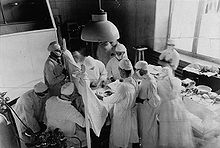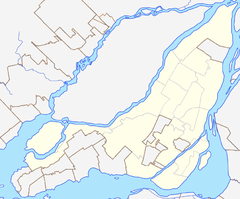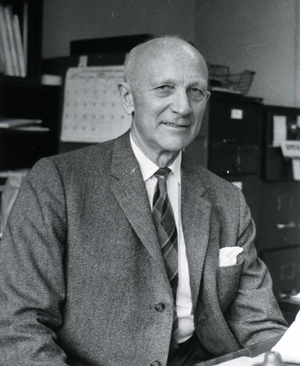
Wilder Graves Penfield was an American-Canadian neurosurgeon. He expanded brain surgery's methods and techniques, including mapping the functions of various regions of the brain such as the cortical homunculus. His scientific contributions on neural stimulation expand across a variety of topics including hallucinations, illusions, dissociation and déjà vu. Penfield devoted much of his thinking to mental processes, including contemplation of whether there was any scientific basis for the existence of the human soul.

The McGill University Health Centre is one of two major healthcare networks in the city of Montreal, Quebec. It is affiliated with McGill University and one of the largest medical complexes in Montreal. It is the largest hospital system in Canada by bed capacity. The majority of its funding comes from Quebec taxpayers through the Ministry of Health and Social Services. The centre provides inpatient and ambulatory care.

Frederick Hans Lowy, is a Canadian medical educator and former President and Vice-Chancellor of Concordia University.
Herbert Henri Jasper was a Canadian psychologist, physiologist, neurologist, and epileptologist.
William Howard Feindel was a Canadian neurosurgeon, scientist and professor.

The Allan Memorial Institute, also known colloquially as "the Allan", is a former psychiatric hospital and research institute located at 1025 Pine Avenue West in Montreal, Canada.
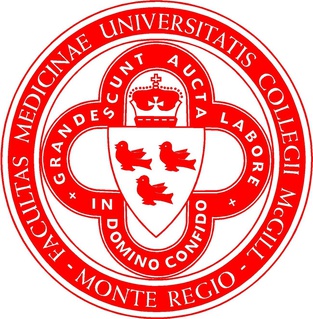
The Faculty of Medicine and Health Sciences is one of the constituent faculties of McGill University. It was established in 1829 after the Montreal Medical Institution was incorporated into McGill College as the college's first faculty; it was the first medical faculty to be established in Canada. The Faculty awarded McGill's first degree, and Canada's first medical degree to William Leslie Logie in 1833.

Sir Mortimer B. Davis Jewish General Hospital, commonly known as the Jewish General Hospital, is an acute-care teaching hospital in Montreal, Quebec, Canada. The hospital is affiliated with McGill University and has 637 beds, one of the most of a hospital site in Canada.

Sir Henry Vincent Meredith, 1st Baronet, was a Canadian banker and philanthropist. He was president of the Bank of Montreal, the Royal Victoria Hospital and the Montreal Museum of Fine Arts. He was governor of McGill University and on the board of the Canadian Pacific Railway. His home in Montreal's Golden Square Mile was made a National Historic Site of Canada in 1990 and is today part of McGill University, named Lady Meredith House for his wife.
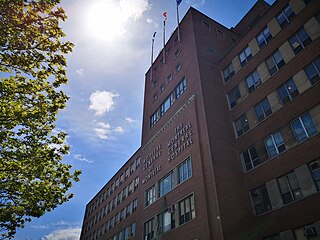
The Montreal General Hospital (MGH) is a hospital in Montreal, Quebec, Canada established in the years 1818–1820. The hospital received its charter in 1823. It is currently part of the McGill University Health Centre (MUHC) and is located on Mount Royal, at the intersection of Pine Avenue and Côte-des-Neiges Road. It has six pavilions: A, B, C, D, E and Livingston (L); plus a research centre in a separate building next to the L pavilion.

Montreal Children's Hospital is a children's hospital in Montreal, Quebec, Canada. Founded in 1904, it is affiliated with the McGill University Health Centre (MUHC) and McGill University, Faculty of Medicine.
Arthur Martin Vineberg, was a Canadian cardiac surgeon, university lecturer and author. He was famous for his experimental and clinical studies in revascularization of the heart.
Balfour M. Mount, is a Canadian physician, surgeon, and academic. He is considered the father of palliative care in North America.
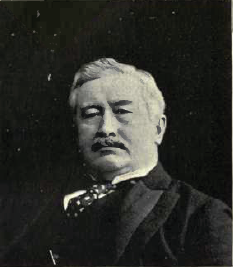
Sir Thomas George Roddick was a Canadian surgeon, medical administrator, politician, and founder of the Medical Council of Canada born in Harbour Grace, Newfoundland

Edward William Archibald was a Canadian surgeon. Archibald was born in Montreal, Quebec, and received his initial education in Grenoble, France. Upon returning to Canada, he attended McGill University, receiving his Doctor of Medicine there in 1896. Archibald became interested in the specialist field of surgery, and began an apprenticeship at Royal Victoria Hospital. After a year in Europe studying under two well known physicians, the young surgeon was appointed to the staff of the Royal Victoria Hospital's Department of Surgical Pathology. However, Archibald became ill with tuberculosis, and moved to New York City for treatment. Upon his recovery, the surgeon returned to Royal Victoria Hospital. There, he developed what he had learned in Europe, and came to be dubbed Canada's first neurosurgeon.

Horst Oertel M.D., Emeritus Professor and Head of Pathology at McGill University, Montreal (1918–1938), he was well-known on both sides of the Atlantic. Five of his books are still published today as standard texts for students of Pathology.

Lady Meredith House, also known as the H. Vincent Meredith Residence, is a historic mansion located at 1110 Pine Avenue West on the corner of Peel Street, in what is today known as the Golden Square Mile of Montreal, Quebec. It was originally named Ardvarna and is now owned by McGill University. The building was designated as a National Historic Site of Canada on November 16, 1990. The house is situated at an altitude of 129 m.
Alice Benjamin is a Canadian specialist in fetal and maternal medicine.

The Montreal Neurological Institute-Hospital(MNI), also known as Montreal Neuro or The Neuro, is a research and medical centre dedicated to neuroscience, training and clinical care, located in the city's downtown core of Montreal, Quebec, Canada. It is part of the McGill University Health Centre network and is situated on the southern slope of Mount Royal along the east side of University Street, just north of Pine Avenue. It was founded in 1934 by neurosurgeon Wilder Penfield, who developed the Montreal procedure there for the treatment of epilepsy.


